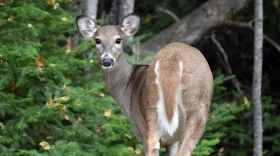Hello, welcome to High Plains Public Radio, this is Freddy Gipp, I’m an enrolled member of the Apache Tribe of Oklahoma and my indian name is “T’sa(N) T’hoop Ah(N)”, meaning Lead Horse in the Kiowa language.
As we previously discussed in our last introduction, “Where The Dead Sit Talking”, focuses on a young Native American boy named Sequoyah, as we join him through the perils of a broken foster care system, meandering through different homes, vying for any sense of identity and belonging.
As Native Americans, we have a keen understanding of our culture, roots and background to this land. We have stories that we tell our younger ones, in hopes that they too can pass on the oral tradition. Our stories give context to our way of life, what we value and how we continue to thrive against all oddities of survival.
What is unfortunate is the fact that our friend - Sequoyah - only has a brief understanding of who he is. He is Sequoyah from Cherokee County, half white and half Cherokee, who wears eyeliner and fantasizes about his friend, Rosemary, in ways that will have you questioning his sexuality.
Like most teenagers, the biggest priority is to be liked and accepted by our friends. To be considered “cool” and invited to hang out, attend birthday parties and sleepovers. It was to have the most signatures in your yearbook, a “go-to” group that you can depend on for anything until you depart for college.
He is a boy that simply realized that all he ever wanted more than anything else in life was to simply be liked and accepted. In his own words, on page 37- Sequoyah emphasizes that, “Moving from place to place, from shelter to foster home, almost always took its toll, and at fifteen I’d never gotten over the crippling anxiety of sleeping in a new room, a new bed, living in a whole new environment.”
Hobson emphasizes the desolate spirit lost in a wondrous soul through Sequoyah’s journey. In Native American culture, our spirit is a recreation of a past life that was prayed upon by our ancestors. What Sequoyah endured at such a young age - impacted the way be moves and thinks and interacts with others.
He is careful and analytical and would rather be alone, wandering throughout Little Crow or in the woods near his house. A displaced character, stuck in the confines of a damaged system designed to repress our Native American children’s creativity, freedom and expression.
This is the forgotten pillar of our culture. The many displaced, dislocated and disassociated children within our culture who are subjected to harsh realities and non-integrative policies that prevent bringing back our children to familiar circumstantial environments. If you are away from culture long enough, without exposure, practicing or simply thinking about it- you lose it. The foster care system is detrimental to many young Native American youth in the United States and has been shifted to the back-burner in many of our newly developed and hyper-partisan problems this Country faces today.
It is unfortunate that many endorse a system that has no beneficial outcome to the older children, with demand for newer families wanting younger toddlers and newborn babies, where do our adolescent teenagers go? Who wants them? Not everyone is like Harold and Agnes Troutt of Little Crow.
This is Freddy Gipp and you are listening to High Plains Public Radio.
I was born and raised in Lawrence, Kansas, where I graduated from the University of Kansas in 2016 with a degree in Strategic Communications from the William Allen White School of Journalism. I currently run my own small consulting firm called Lead Horse LLC, which focuses on utilizing Native American Powwow celebrations as an effective economic driver for urban and rural communities.







